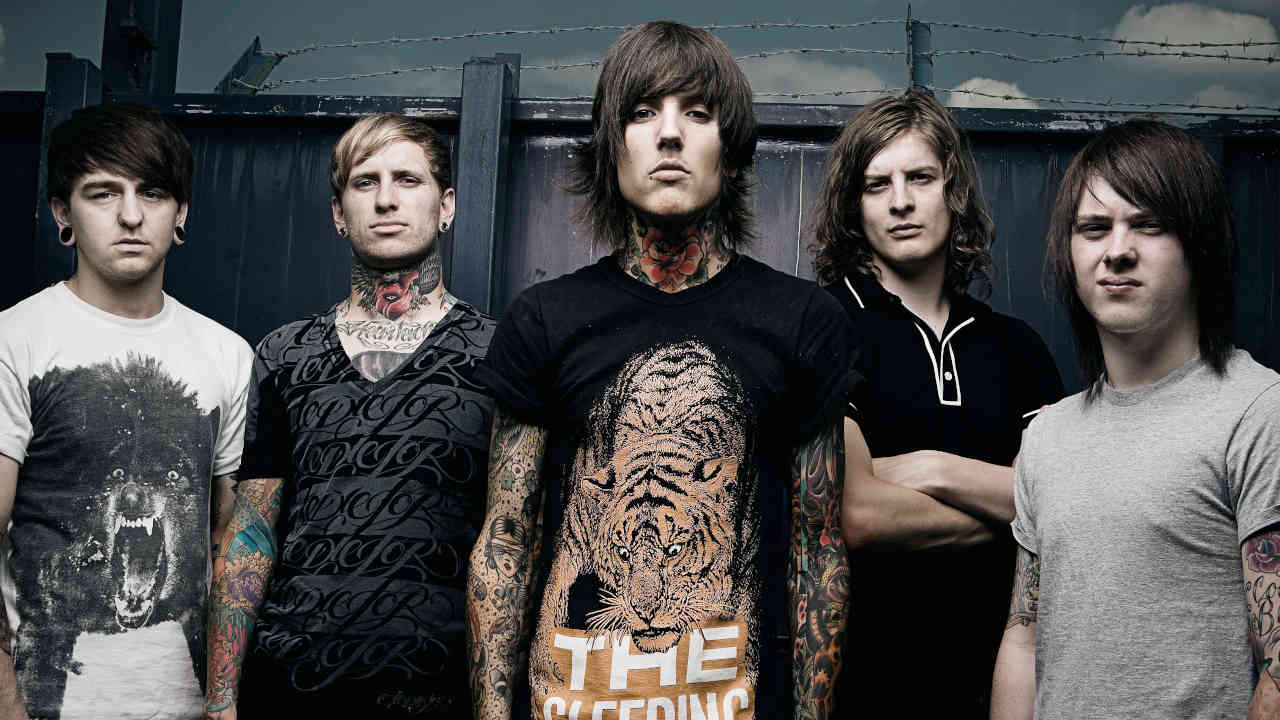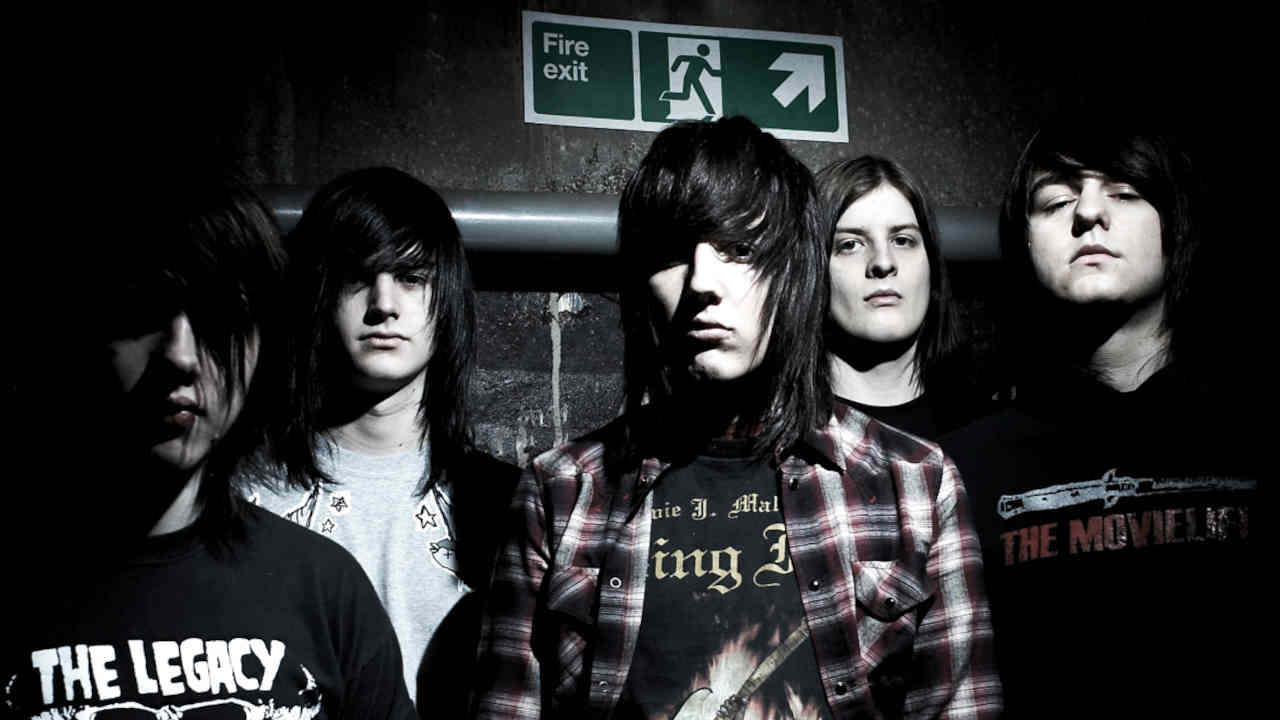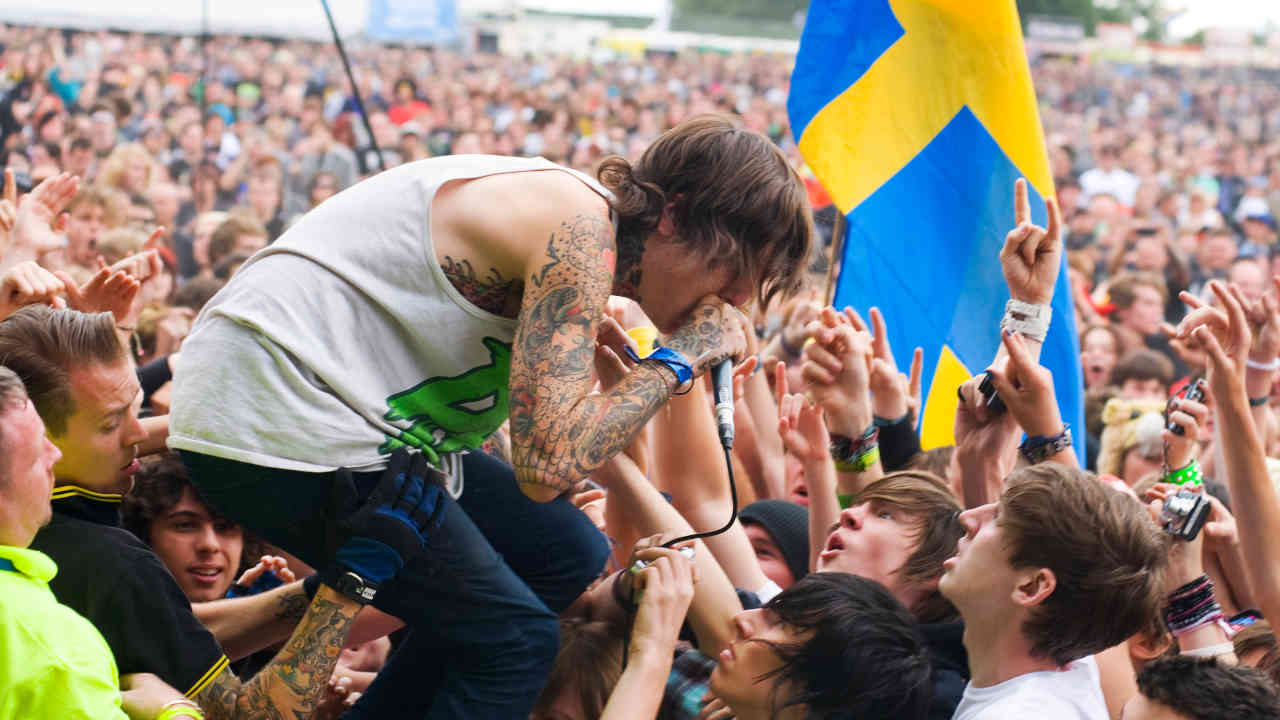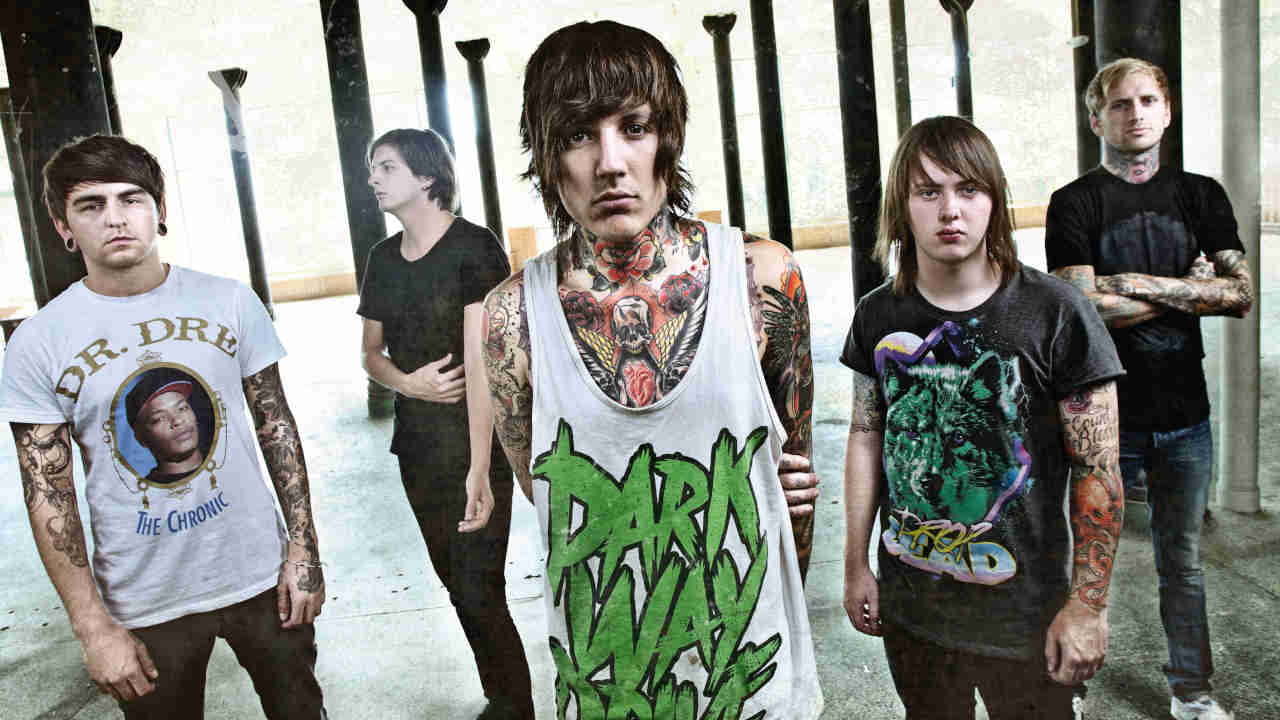
Bring Me The Horizon’s surprise-released new album, Post-Human: Next Gen, has reaffirmed the Sheffield band as one of most forward-looking metal bands of the 21st century. Their transformation from deathcore brats into something more intriguing began with 2008’s Suicide Season, but it was 2010’s game-changing There Is a Hell Believe Me I've Seen It. There Is a Heaven Let's Keep It a Secret. which announced the arrival of a band who would help define the next decade and beyond. In 2011, six months after the album was released, Metal Hammer sat down with singer Oli Sykes, guitarist Lee Malia and drummer Matt Nicholls to talk ambitions, controversy and dealing with the haters in their most in-depth interview yet.
Whether you’re in awe of their music and aesthetic, or bitterly hate everything about them, Bring Me The Horizon are one band that are guaranteed to provoke a strong reaction. Mentioning their name is akin to releasing a few drops of blood into a tank full of piranhas, thanks to the frenzy of activity it causes, with committed haters and diehard supporters alike fighting to voice their opinion on the Sheffield five- piece.
Rarely has a band been so divisive, and that seems to be just the way they like it, having merrily stepped on toes left, right and centre since their formation. Not enough that they should use deathcore – the bastard combination of hardcore and death metal viewed with outright suspicion by both communities since day one – as their mode of expression, they also appear to have gone out of their way to antagonise all non-believers and stick one collective middle finger to anyone who dares to suggest that they show respect to the bands and scene that existed before they came along. This is, after all, the group who once claimed that Napalm Death were “not really grindcore”.
Ultimately, BMTH’s notoriety stems not only from their outspoken and provocative nature, but the fact that they are almost entirely at odds with the rest of the metal scene, not least in their stylised and fashion-conscious appearance, which has earned them accusations of style over substance. Add to this the fact that vocalist Oli Sykes – who soaks up a good deal more than his 20 per cent share of the hate aimed at the band – is viewed by many as a spoilt rich kid (now even richer thanks to his successful clothing line) and what you’re left with is one of the most despised bands in the history of heavy music. And let’s be fair, they are damn heavy, whatever other criticisms can be thrown their way.
All the same, not since the last wave of hair metal brought us the likes of Poison, has a band attracted such vitriol. Given the sloppy, alcohol- fuelled performances and generic material that marked their early days, there was very little to persuade anyone that this was a band that was anything less than undeserving of it. But along the way something interesting happened. The group began to create material that couldn’t be so easily discounted.
The first signs were evident in 2008’s Suicide Season, but it was 2010’s epically titled There Is A Hell, Believe Me I’ve Seen It. There Is A Heaven, Let’s Keep It A Secret that really put the cat among the pigeons. With this surprisingly varied, experimental and frequently powerful album it seems that, at the least, the accusations of creative redundancy have been rendered… well, redundant. That doesn’t mean you have to like them of course, but nevertheless ignoring them is becoming an increasingly difficult task.
We hunted down vocalist Oli Sykes, guitarist Lee Malia and drummer Matt Nicholls, three of the band’s founding members, to try to figure out where the hell this band is coming from, and where exactly they’re going.

You first burst into public consciousness some five years ago. What were your musical backgrounds and how did you come together?
Oli: “We all come from different musical backgrounds. When I was 13 I was into Limp Bizkit and Linkin Park, but when we formed this band, me and Matt were more into American metalcore like Norma Jean, Skycamefalling, bands that we found on the internet. At the same time we also went to a lot of local straightedge hardcore shows – we had no idea about the bands that were playing, we’d just turn up and dance. Lee was from a different background – he was in a Metallica tribute band, and more into Metallica, Pantera and also At The Gates, who me and Matt had never heard of.”
Lee: “I met Matt at a college in Rotherham. One day we just said, ‘Oh, it’d be cool to do a band like Dillinger Escape Plan’, ’cos I was at a point where I was just starting to hear about bands like Dillinger. I’d been into Metallica and stuff for that long that I hadn’t, like, heard the next level of heavy. So they were telling me about all these bands and I was telling them about bands like At the Gates, Arch Enemy and In Flames.”
You quickly established a reputation as a bunch of cocky young upstarts. How do you think that came about?
Lee: “We were 17, 18, 19 at that time… naïve kids just getting pissed, getting on tour buses, thinking, ‘This is fucking rad!’”
Matt: “You put a bunch of 19-year-olds on a tour bus, and no matter who it is, you give ’em free beer, it’ll end in tears.”
Oli: “We’re a bunch of lads. At the end of the day, put anyone like us in that situation, they’re gonna get in trouble. And we didn’t give a fuck; we’d get onstage pissed out our minds.”
At what stage did that change?
Oli: “We kept getting bigger and we realised we had to take things more seriously or throw it all away. We never had any expectations for this music to start getting mainstream. We were on tour buses making really good money, and when that first happened it were like, ‘Woah!’ You just go absolutely mental. But it became more normal, more like a job to us.”
Now you’re playing huge shows supporting Bullet For My Valentine. Does playing tours like this feel like a slap in the face of your detractors? Do you feel you get more respect?
Oli: “Nah… We still got booed. Then again, years ago we’d be getting boos and getting into fights with people in the crowd at our own headline shows. It’s like, ‘You paid to be here, there’s no one on after us and you’re still throwing shit at us!’”
Matt: “…Just fuck off.”
Oli: “We don’t get that any more, so it’s weird to come back and have people treat us like that.”
How do you react to that sort of treatment?
Lee: “Even if the whole crowd booed, we’d still play a full set. We’ve got nowt to be ashamed of! We haven’t done anything wrong, we’ve never changed, we’ve not jumped on any bandwagon, so we’ll just do what we do. That’s all we can do.”
Matt: “There were a guy one night with a bright work jacket and written on it was ‘Bring Me The Horizon suck’ and he must have held it up during our whole set.”
Oli: “I said, ‘Nice reflective jacket. You wearing that to work tomorrow?’ I said, ‘When you’re at work wearing that jacket, I’ll be supporting your favourite band, you fucking twat.’”
Why do you think it is that some people hate you so much?
Lee: “Some people who like our band, they don’t actually like our music, it’s just a trend they’ve cottoned onto and they like the band for no reason. But I honestly feel that’s why some people hate us too. They hate us because that’s just what you do, ’cos of the way we look, it’s mindless. Some people don’t even realise that if it were a band looking like Bullet [For My Valentine] playing our music, they wouldn’t hate it.”
Matt: “I think some people are a bit intimidated by the fact that we’re a bit different. But I think times are changing. These traditional metal kids who don’t like us ’cos of the way we look and we’re not metal enough, the faster they get over it, the faster they can stop sitting and crying about it.”
It seems a lot of people don’t see you as being an authentic part of metal’s lineage. Why is this and where do you feel you suit in the big picture of heavy music?
Oli: “A lot of people are just so close-minded, not just in the metal scene, but in all scenes. There’s so many barriers and it’s not just music. When I were at school I got into metal ’cos I hated the people that bullied me, so I went to a different place. You’re so angry at those people that liked pop music and hip hop you’re like, ‘Fuck them, that’s nothing to do with me’, but you never really give it a chance. We just like music ’cos it’s good now. But I don’t expect everyone to be like that, ’cos I used to be the same, I used to hate everything else ’cos the people that liked it didn’t necessarily like me.”
Lee: “We’re just doing what we do – we are influenced by other bands but I don’t think we need to pay homage. That’s the music we love, but at the same time we want to do our own thing, we’re influenced by so much different stuff we’ve kinda come into our own sound. I feel like when you look back at all the greatest bands, that’s what they did.”
Oli: “It’s started to change a bit now as well. If these people didn’t see the name on our CDs they’d probably be into it.”
Do you think perceptions of you have changed, then?
Matt: “People will always think we’re little dickheads.”
Lee: “Even though we’ve stuck with it six years, people still think we’re this young band who’s jumped from, like, nowhere to somewhere, that it’s just fashion or something.”
Oli: “With our new CD, everything’s turned around. If this tour had happened a couple of years ago, the booing and the negativity would be double. When we supported Killswitch [Engage] a couple of years ago, that was a nightmare. The size of the pits we get at the Bullet shows is absolutely unreal.”

There’s certainly no denying that. Despite the wall of disdain and hostility that some diehard Bullet fans presented during the tour – crossed arms, frowns and jeering – there were far more people going apeshit when BMTH were on stage, a point underlined when the group’s performance at Wembley was cut short due to concern over the exuberant pits, not least because of Oli’s incitement of such behaviour.
It’s impossible to say exactly how much of this warm reception is down to the merits of There Is A Hell…, but there’s no doubt that the album has been instrumental in shifting perceptions of the group, with an almost unanimous wave of praise emanating from critics and fans alike. From opening track Crucify Me, which includes clean, emotive guitars, female vocals and jarring electronic touches, the ambition of the band is clear, something also evident during the soulful instrumental ambience of Memorial and in the additions of orchestral and choral parts on the album.
Mirroring this musical expansion is a notably darker, more in-depth and rounded conceptual approach, evident both in the esoteric artwork and Oli’s increasingly personal and seemingly confessional lyrics. Sure, some might find them to be a little self-dramatising given that they’re coming from a guy with what appears (on the face of it) to be a pretty cushy existence, but they’re thoughtful, abstract and well constructed enough to make them easy for listeners to identify with, whatever their circumstances. No surprise, then, that the release has achieved impressive sales.
It looks like you approached There Is A Hell… with big ambitions. Did you think it’d turn as many heads as it has?
Lee: “We wanted to make it sound big, we wanted it to be more than a standard album, we wanted to push ourselves.”
Oli: “I enjoy writing and I’m into the idea of progression. Suicide Season opened us up to that chance to do stuff like that, add choirs and orchestras, try this new shit out. It paid off, it turned people’s opinion of us around. It got us to where we are now. There was a time when it felt like it was hanging by a thread… when that shit kicked off with me allegedly pissing on someone, mags wouldn’t cover us, people just said we were shit… It felt like we were going to bomb.”
Were those assault allegations the hardest thing you’ve faced?
Lee: “It was the hardest thing for all of us. It wasn’t true ’cos, like, there’s CCTV footage showing it’s not true. It was proved not true, but people make up their own minds.”
Oli: “It made us stronger, but it was a really trying time. It was really difficult and so many people loved it, thrived off it. It was embarrassing family-wise, and it stung so hard ’cos it wasn’t true but no one wanted to believe that. People believe what they want to believe. But the attention and controversy gave us more desire to make a fucking good album. It made me think with Suicide Season, we gotta do something special. Everyone put 110 per cent into it. Everyone was waiting for us to fail and it kinda shut everyone up.”
Did that experience affect the way you conducted yourselves?
Oli: “That’s one of the main things we realised when all that shit kicked off. It’s like, anyone else could get away with it – if we were just kids at a club you’d get away with the shit we do.”
Lee: “Or someone like Mike Patton, he pisses on a crowd and he’s the coolest guy ever.”
Matt: “We’re easy targets, ’cos we were little bastards.”
Why do you think you’re treated differently?
Matt: “’Cos we probably were little cocky bastards with stupid haircuts and crap jeans on.”
Oli: “At first it upset me, then I realised how many people I hate, just ’cos of a face they pull or something, so I’ve no right to be mad at someone who hates me for no reason. Like all these people I hate, if I met them I’d shake their hand, just like these people probably would with me.”
There Is A Hell… isn’t a concept album, but it features pretty conceptual lyrics. Where did the inspiration come from for that?
Oli: “As time goes on there’s a lot more to write about. As a kid I’d write about being bullied or something. The themes of Heaven and Hell on this album, that’s not in a Christian sense. It’s not about being in a place after death, it’s about emotions, stuff that everyone goes through. Heaven and Hell can be places you go to personally. It’s not bullshit, it’s stuff I’ve been through. There’s a lot of good shit in my life, and a lot of bad.”
What sort of bad shit?
Oli: “I’ve got the best job, but it puts pressure on relationships, on everything that goes on apart from the band. When you’re in a band you lose innocence, you see and do stuff you wouldn’t do if you weren’t in this career. A lot of it is to do with vices and addictions. I wouldn’t want to go any more into it.”
You’ve said your early lyrics were inspired by your being bullied…
Oli: “I moved to England from Australia when I was about eight. I was the new kid and I had a different accent, the odd one out. I made a couple of friends, but when I was in junior school, I don’t think I had any friends really. High school I made a bunch of friends but I got bullied a lot. I don’t think the band would exist if it wasn’t for the life that I’ve had, the shit that’s happened to me. It was a way to vent it all.”

Has it been tough growing up in the limelight?
Lee: “We’ve done this pretty much since school, so we’ve known no different.”
Oli: “I find it weirder to look at what is normal for people, like a 9 to 5 job, then one holiday a year where they go to Greece. There’s no way I could do that – if this ended today I’d have to try and figure out some- thing. You know, a 9 to 5 job, knowing that I’ve worked an hour for six quid, you know, I couldn’t do that.”
Have you been spoilt?
Lee: “We worked three years without getting a penny. I did labouring to afford gear. We haven’t been privileged and gone straight into a record label giving us tons of money. We’ve slept on floors and missed out a lot of easy shit for years to do a hard life touring.”
Now there’s a new generation of bands such as Asking Alexandria following hot on your tails. Do you feel you have to work even harder now? How do you view the future?
Matt: “When we see Asking Alexandria it reminds us of us, how we started, young kids doing well for themselves and people giving them a hard time just because they’re young.”
Oli: “People are starting to accept that we’re doing something good, and we’re not just talentless little knobs from Sheffield, we’ve got a rightful place in this scene. A couple of years ago it felt like there wasn’t a future for us, now it feels like there’s a big future.”
Matt: “It could have been so shit, we could have fallen on our arse, so it’s really cool that we’re still doing it. As long as we’re having a good time we will keep doing it.”
Oli: “No matter how many people hate us, we’ll keep doing this. People can slag me off, but at the end of the day, I’m not working and doing a shit job, I’m having the time of my life!”
Originally published in Metal Hammer issue 216







